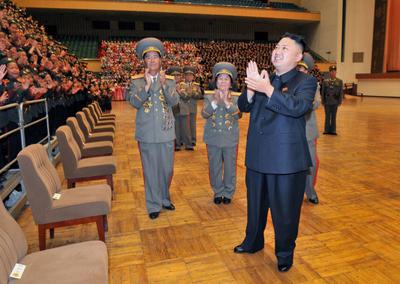The choice of gifts is deeply symbolic — a delicate matter involving much discussion and negotiation. As well as being suitably generous, the presents should accord with the current policies of the North Korean government. In 1972, when North Korean leader Kim Il-sung celebrated his 60th birthday, the main gifts were a textiles factory and a glassworks. In 1992, for his 80th birthday, the present was the Mangyongbong 92, a passenger ferry, which plied the seas between Japan and North Korea until the imposition of sanctions in 2006.
In April 2012, when North Korea celebrated the centenary of Kim Il-sung’s birth, the principal gift was more modest, but no less symbolically significant. It consisted of a long train of mobile food stalls, which can be moved around the streets of Pyongyang and used to sell various fast-food favourites. They are, by all accounts, very popular.
The stalls are just one small sign of change in a system long trapped in the ice-age of the late Kim Jong-il’s ‘army first’ policies. The choice of fast-food stalls as a gift to celebrate such an auspicious occasion reflects a recognition of the direction in which the new leadership of Kim Jong-un would like to take the country. Recent visitors to Pyongyang have noticed other evidence of an expanding consumer economy. Bright displays of clothes, furnishings and toys decorate the windows of the city’s few department stores. Private vegetable and snack stalls, once hidden away in backstreets, are now starting to appear (albeit in small numbers) on the sides of main streets.
So far, many signs of change have been symbolic rather than substantive. Kim Jong-un cuts a very different figure from his guerrilla-fighter grandfather, Kim Il-sung, and from his father, Kim Jong-il, who rarely travelled overseas. Since assuming the post of leader, Swiss-educated Kim Jong-un has visibly defied convention by appearing in public with his fashionably dressed wife and by allowing TV cameras to film him enjoying the delights of a fun-fair ride in the company of a British diplomat. At a more substantive level, the regime — represented by Kim Jong-un’s uncle-by-marriage Jang Sung-taek — has been energetically pursuing deepened economic ties to China, particularly in the Rajin-Sonbong Special Economic Zone, which some observers see as a possible seedbed for future North Korean experiments with the market economy. At the same time, the new leadership has shown signs of wanting to balance its dependence on China with closer ties to Vietnam and other Southeast Asian countries.
Surprisingly, there have even been overtures toward the old arch-enemy, Japan. At the time of the Kim Il-sung centenary in April, Song Il-ho, North Korea’s chief negotiator with Japan, told a visiting delegation that North Korea was willing to return the remains of Japanese citizens who died in the country following the collapse of Japan’s colonial empire. This initiative opened the way to negotiations between the Japanese and North Korean Red Cross Societies and provided the basis for middle-level negotiations between Japanese and North Korean officials, which started in Beijing on 29 August. North Korea hopes that a thawing of relations with Japan, frozen since the 2002 revelations about the kidnapping of Japanese citizens by the DPRK, will open the way to economic ties and aid flows from Japan. Japan hopes for a restart of investigations into the kidnapping incident. Caution and patience will be needed on both sides to ensure that this opportunity for renewed dialogue is nurtured, rather than being allowed to collapse into renewed mutual recriminations.
The greatest challenge for the new leadership is North Korea’s overwhelming problem of rural poverty and malnutrition. Here, too, small signs of change are evident. The new leadership is reportedly drawing up reforms allowing farmers to keep and privately sell part of their crop, but these changes have yet to be put into effect.
The task of reforming and opening North Korea’s moribund economy is enormous, and it remains to be seen whether the new leadership has the expertise to set the country on a new course. Change inevitably generates instability. North Korean officials, accustomed to a chronically inefficient but reasonably predictable system, now face alarming new uncertainties. A backlash is possible, particularly if North Korea feels that its overtures to the outside world are being rebuffed. The signs of change should be welcomed by other countries in the region, including Australia, and used as an opportunity for cautious steps toward economic and cultural re-engagement with the long-isolated country. At a time of increased international tensions in Northeast Asia as a whole, North Korea is not only important in its own right, but also a key to the future peace of the entire region.
Tessa Morris-Suzuki is Professor of Japanese History at the College of Asia and the Pacific, the Australian National University.

